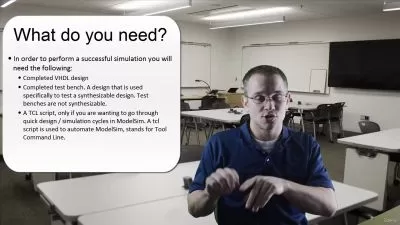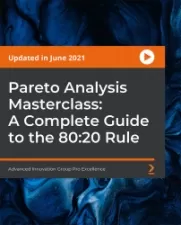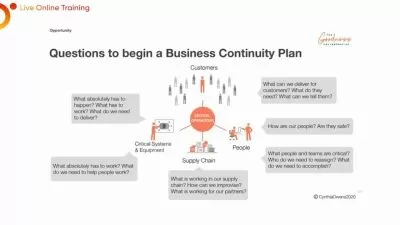Multi-Criteria Decision Making (MCDM) Using Matlab and Excel
Operation Research Group
13:01:09
Description
Learn how to implement different approaches using Microsoft Excel and Matlab language programming to solve real-world M
What You'll Learn?
- Gain a foundational understanding of the Multi-Criteria Decision Making process and its significance in various fields
- Dive deep into the most recent methods and techniques in MCDM, ensuring that students stay at the cutting edge of the discipline.
- Acquire proficiency in leveraging Excel to tackle MCDM problems, from basic to advanced levels.
- Learn to use Matlab as a powerful tool for addressing MCDM scenarios, from setting up decision problems to solving complex cases.
- Equip yourself with the ability to program and customize various MCDM techniques, allowing for flexibility and adaptability in problem-solving
Who is this for?
What You Need to Know?
More details
DescriptionMulti-Criteria Decision-Making (MCDM) has evolved as a pivotal aspect of operations research, focusing on the creation of computational and mathematical instruments to aid decision-makers in their subjective evaluation of performance criteria.
For the first time on Udemy, we present an all-encompassing course that delves deep into a variety of MCDM methodologies. This practical course is tailored to meet the needs of students, researchers, and professionals in the field.
Our approach to each MCDM methodology is threefold:
We kick-start with an introduction to the foundational theory of the method.
Following this, we provide hands-on implementation using Microsoft Excel.
To conclude, we transition into coding the method with Matlab programming.
Course Outline:
Introduction to MCDM
Simple Additive Weightage (SAW)
Analytic Hierarchy Process (AHP)
Analytic Network Process (ANP)
Technique for Order Preference and Similarity to Ideal Solution (TOPSIS)
Elimination Et Choice Translating Reality (ELECTRE)
Preference Ranking Organization Method for Enrichment Evaluations (PROMETHEE)
VIseKriterijumska Optimizacija I Kompromisno Resenje (VIKOR)
Decision-Making Trial and Evaluation Laboratory (DEMATEL)
Grey Relational Analysis (GRA)
Multi-objective Optimization on the Basis of Ratio Analysis Method (MOORA)
Complex Proportion Assessment Method (COPRAS)
Additive Ratio Assessment Method (ARM-ARAS)
Weighted Aggregated Sum Product Assessment (WASPAS)
Stepwise Weight Assessment Ratio Analysis (SWARA)
COmbinative Distance-based ASsessment (CODAS)
Evaluation Based on Distance from Average Solution (EDAS)
Measurement Alternatives and Ranking according to COmpromise Solution (MARCOS)
CRiteria Importance Through Intercriteria Correlation (CRITIC)
Entropy Weighting Technique
Additionally, the course is enriched with an extensive selection of coding tutorials, ensuring students have ample opportunities to cement their theoretical understanding with practical exercises.
Upon successful completion of this course, participants will be well-equipped to apply Excel and Matlab to a plethora of MCDM challenges. This foundation will also pave the way for exploring and mastering other MCDM strategies.
Who this course is for:
- Those studying operations research, management science, engineering, business analytics, or any field where decision-making processes are crucial.
- Engineers, data analysts, operations managers, and others who need to make informed decisions by considering multiple criteria.
- Professionals who advise businesses on decision-making strategies and need tools to analyze multiple decision factors simultaneously.
- Professors and educators who wish to incorporate MCDM methodologies into their curriculum or research.
- Individuals keen on learning how to implement MCDM techniques using popular software tools like MATLAB and Excel.
- Executives, managers, or anyone tasked with making complex decisions where multiple factors need to be weighed and considered.
- Those with a curious mind about structured decision-making processes and how software can aid in such tasks.
Multi-Criteria Decision-Making (MCDM) has evolved as a pivotal aspect of operations research, focusing on the creation of computational and mathematical instruments to aid decision-makers in their subjective evaluation of performance criteria.
For the first time on Udemy, we present an all-encompassing course that delves deep into a variety of MCDM methodologies. This practical course is tailored to meet the needs of students, researchers, and professionals in the field.
Our approach to each MCDM methodology is threefold:
We kick-start with an introduction to the foundational theory of the method.
Following this, we provide hands-on implementation using Microsoft Excel.
To conclude, we transition into coding the method with Matlab programming.
Course Outline:
Introduction to MCDM
Simple Additive Weightage (SAW)
Analytic Hierarchy Process (AHP)
Analytic Network Process (ANP)
Technique for Order Preference and Similarity to Ideal Solution (TOPSIS)
Elimination Et Choice Translating Reality (ELECTRE)
Preference Ranking Organization Method for Enrichment Evaluations (PROMETHEE)
VIseKriterijumska Optimizacija I Kompromisno Resenje (VIKOR)
Decision-Making Trial and Evaluation Laboratory (DEMATEL)
Grey Relational Analysis (GRA)
Multi-objective Optimization on the Basis of Ratio Analysis Method (MOORA)
Complex Proportion Assessment Method (COPRAS)
Additive Ratio Assessment Method (ARM-ARAS)
Weighted Aggregated Sum Product Assessment (WASPAS)
Stepwise Weight Assessment Ratio Analysis (SWARA)
COmbinative Distance-based ASsessment (CODAS)
Evaluation Based on Distance from Average Solution (EDAS)
Measurement Alternatives and Ranking according to COmpromise Solution (MARCOS)
CRiteria Importance Through Intercriteria Correlation (CRITIC)
Entropy Weighting Technique
Additionally, the course is enriched with an extensive selection of coding tutorials, ensuring students have ample opportunities to cement their theoretical understanding with practical exercises.
Upon successful completion of this course, participants will be well-equipped to apply Excel and Matlab to a plethora of MCDM challenges. This foundation will also pave the way for exploring and mastering other MCDM strategies.
Who this course is for:
- Those studying operations research, management science, engineering, business analytics, or any field where decision-making processes are crucial.
- Engineers, data analysts, operations managers, and others who need to make informed decisions by considering multiple criteria.
- Professionals who advise businesses on decision-making strategies and need tools to analyze multiple decision factors simultaneously.
- Professors and educators who wish to incorporate MCDM methodologies into their curriculum or research.
- Individuals keen on learning how to implement MCDM techniques using popular software tools like MATLAB and Excel.
- Executives, managers, or anyone tasked with making complex decisions where multiple factors need to be weighed and considered.
- Those with a curious mind about structured decision-making processes and how software can aid in such tasks.
User Reviews
Rating
Operation Research Group
Instructor's Courses
Udemy
View courses Udemy- language english
- Training sessions 73
- duration 13:01:09
- Release Date 2023/10/28


























